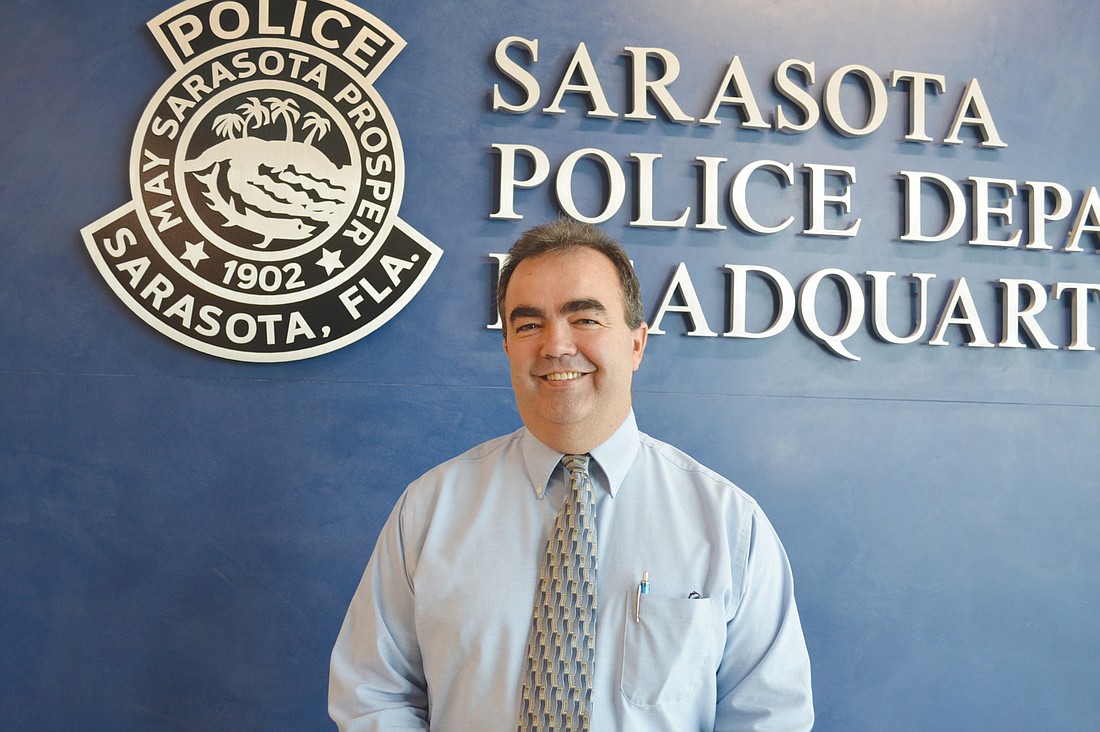- May 7, 2025
-
-
Loading

Loading

Paul Sutton stood at the scene of a murder at the corner of Martin Luther King Jr. Boulevard and Pershing Avenue. Still a rookie officer, he was assigned to control the perimeter of the crime scene to ensure no one interfered with the police work.
When a woman approached the young officer to tell him she knew who the killer was, Sutton recognized her from regular conversations during his patrols. Most officers tended to avoid her, but Sutton had developed a rapport with her, and she felt comfortable enough to confide in him.
Sutton learned early on the importance of being able to relate to people. When he joined the Sarasota Police Department in 1984, a senior officer gave him a tip: Treat people right; if you arrest someone today, chances are, you’re going to deal with them again in the future.
The advice helped Sutton solve that first murder case as a rookie officer, and it’s a skill he developed and carried throughout his career.
Now, one week into retirement after 29 years with the SPD, Sutton reflects on his career in law enforcement, and the people skills that made him successful.
A solid start
Born in St. Louis, Sutton moved in 1973 to Sarasota with his family. He graduated from Sarasota High School, and, like most of the men in his family, he served four years in the Army.
Initially wanting to become a lawyer, Sutton took the police exam to give himself a more diverse background in law.
“After I took the test, I discovered I loved police work, and I realized I didn’t want to do anything else,” he says. “I’d rather be the one catching the bad guy.”
Sutton quickly moved up the ranks within the department. Solving a murder as a rookie earned him a promotion to detective with just three years of experience on the force.
As a detective, Sutton began to hone his ability to relate to suspects, and his ability to garner confessions earned him a reputation. He boasted a 100% conviction rate on every case he oversaw as the lead detective.
“On TV, you see detectives screaming at people to get them to talk,” he says. “That never made sense to me. I tried to think about what would make me talk to the police. I never asked them if they did it — I asked why they did it. Most people want a chance to tell their side of the story.”
Finding his passion
Sutton’s career spanned nearly every position and duty within the department. From homicide, he moved on to became a detective sergeant specializing in crimes against children, then on to lieutenant, commander of narcotics, captain and even acting police chief.
Whether he was interviewing accused sexual predators, coaxing confessions from suspected murderers or intercepting duffel bags of cocaine from drug dealers on a boat in Venezuela, his ability to talk to people helped him become a strong leader who earned the respect and admiration of those around him.
“I think that ability to communicate is important in any aspect of a career,” says Sutton. “My job as a supervisor was to help other people do their jobs, and that meant treating people the way I would want to be treated. I’m more proud of their work than of anything I did.”
Perhaps Sutton’s biggest passion, especially in the latter portion of his career, was doing his part to solve Sarasota’s homeless problem.
“There’s a lot of division over the issue in Sarasota,” he says. “People think it’s the rich condo owners against the homeless people. To me, there’s only one side, and that’s getting these people the help they need without enabling them. That helps everyone.”
Sutton’s passion for the issue is evident in his service. He was a founding board member of the Suncoast Partnership to End Homelessness, and he also serves on the Salvation Army’s advisory board. He was influential in creating the Salvation Army’s VIPER drug-and-alcohol recovery program in an effort to provide help to many of Sarasota’s homeless. Bryan Pope, general manager of the Salvation Army, says Sutton has been a valuable asset to the advisory board.
“He’s a man of integrity, and he’s passionate about finding solutions to problems,” he says. “He’s not there for a plaque on the wall — he’s there to get the job done.”
Although the reality of his retirement has yet to set in, Sutton says he knows it will be an adjustment. Most of all, he looks forward to having more time for his wife, children and grandchildren, and he hopes to continue serving on various boards to address homelessness and addiction.
“Paul has had an enormous impact on Sarasota, in a very quiet way,” says Pope. “Although his career in law enforcement is coming to a formal close, we’ve not seen the end of him having a positive impact on the community by a long shot.”